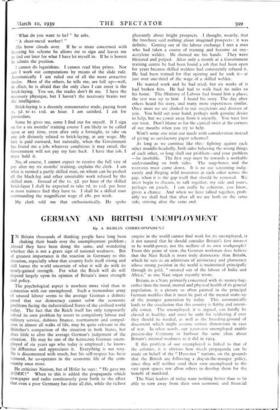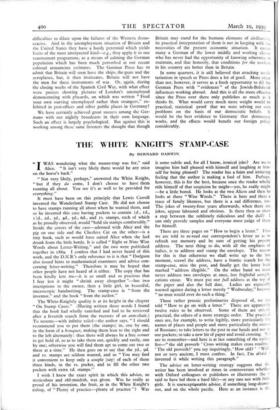GERMANY AND BRITISH UNEMPLOYMENT
By A BERLIN CORRESPONDENT
1 N Britain thousands of thinking people have long been shaking their heads over the unemployment problem ; abroad they have been doing the same, and wondering whether this is not a grave sign of national weakness. But of greatest importance is the reaction in Germany to this situation, especially when that country feels itself strong and still leaves the world uncertain of what it will do with its newly-gained strength. For what the Reich will do will depend largely upon its opinion of Britain's inner strength and policy.
The psychological aspect is nowhere more vital than in connexion with our unemployed. Such a tremendous army of unused labour seems to the average German a definite proof that our democracy cannot solve the economic problems facing the industrialised States of the civilised world today. The fact that the Reich itself has only temporarily solved its own problem by resort to compulsory labour and military service, dubious finance, rearmament and compul- sion in almost all walks of life, may be quite ielevant to the Britisher's comparison of the situation in both States, but does little to alter the average German's judgement of the situation. He may be one of the 6,000,00o German unem- ployed of six years ago who today is employed ; he knows the difference and appreciates it. Everything is not rosy. He is discontented with much, but his self-respect has been restored, he co-operates in the economic life of the com- munity once more.
He criticises Nazism, but of Hitler he says: "He gave me WORK!" When to this is added the propaganda which newspaper and radio continuously pour forth to the effect that even a poor Germany has done while the richest empire in the world cannot find work for its unemployed, is it not natural that he should consider Britain's first interest to be world-power, not the welfare of its own workpeople? From this point of view, the German workman does believe that the Nazi Reich is more truly democratic than Britain, which he sees as an admixture of aristocracy and plutocracy whose strong position in the world is maintaincd principally through its gold, "sweated out of the labour of India and Africa," as one Nazi organ recently wrote.
Britain, as a State primarily concerned with its money-bags rather than the moral, mental and physical health of its general population, is a picture so often painted in the principal German weeklies that it must be part of the mental make-up of the younger generation by today. This automatically leads to the conclusion that this country is flabby and intern- ally rotten. The unemployed, it is argued, can hardly be classed as healthy, and must be unfit for soldiering if ever they should be needed, as well as the breeding-ground of discontent which might assume serious dimensions in case of war. In other words, our 2,000,000 unemployed enable present-day Germany to harbour the same ideas about Britain's internal weakness as it did in 1914.
If this problem of our unemployed is linked to that of the colonies, it is obvious how much propaganda can be made on behalf of the " Have-not " nations, on the grounds that the British are following a dog-in-the-manger policy, since they will neither send their own unemployed to the vast open spaces nor allow others to develop them for the benefit of mankind.
The Nazi leaders of today want nothing better than to be able to turn away from their own economic and financial difficulties to dilate upon the failures of the Western demo- cracies. And in the unemployment situation of Britain and the United States they have a hardy perennial which yields fruits of the most unexpected kind—e.g., they apply it to our rearmament programme, as a means of calming the German population which has been much perturbed at our recent colossal armaments estimates. The German Press has to admit that Britain will soon have the ships, the guns and the aeroplanes, but, it then insinuates, Britain will not have the men for these instruments of war. Or, again, during the closing weeks of the Spanish Civil War, with what effect were posters showing pictures of London's unemployed demonstrating with placards, on which was written "Feed your own starving unemployed rather than strangers," ex- hibited in post-offices and other public places in Germany!
We have certainly achieved great success among the Ger- mans with our nightly broadcasts in their own language. Such an effect is largely psychological. But against this is working among these same listeners the thought that though Britain may stand for the humane elements of civilisation, its practical interpretation of them is not in keeping with the necessities of the present economic situation. It causes many a German of the lower middle and working classes who has never had the opportunity of knowing otherwise to maintain, and that honestly, that conditions for the workers in his country are better than in Britain.
In some quarters, it is still believed that attacking totali- tarianism in speech or Press does a lot of good. More often than not, however, it serves as a fresh opportunity to fill the German Press with " evidences " of the Jewish-Bolshevik influences working abroad. And this is all the more effective since the Press over there only publishes as much as it thinks fit. What would carry much more weight would be practical, statistical proof that we were solving our own problems on the basis of our democratic beliefs. It would be the best evidence to Germany that democracy works, and the effects would benefit our foreign policy considerably.











































 Previous page
Previous page